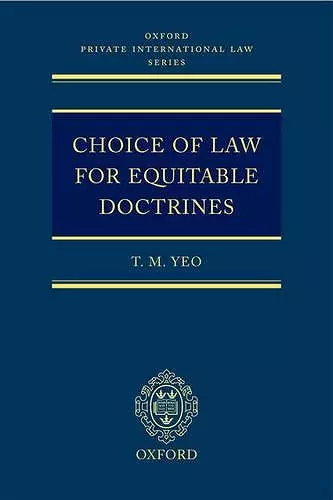Choice of Law for Equitable Doctrines
Format:Hardback
Publisher:Oxford University Press
Published:9th Sep '04
Currently unavailable, and unfortunately no date known when it will be back

It is an unfortunate feature of the common law conflicts landscape that, for all its sophistication, the relationship between the equitable principles of the forum and the forum's choice of law process remains unclear. This book examines this relationship from the perspective of English law, taking account of the impact of European law. What law applies when litigants invoke the principles of equity of the forum or analogous doctrines in foreign law? This book suggests that there is nothing inherent in the invocation of the forum's equitable jurisdiction or in the nature of equitable discourse that renders the application of the forum's equitable principles inevitable. It then considers whether a different methodology should be adopted for equitable doctrines, and concludes that this should not be the case. Thus, unless the issue involves the application of fundamental public policy, mandatory forum laws or the procedure of the forum, equitable doctrines of any country should be subject to the same choice of law analysis like other principles of substantive law. The book then analyses equitable doctrines within the traditional choice of law categories of property, contracts, torts and restitution in three steps: first, many equitable doctrines may be regarded as substantive and not procedural; secondly, property and obligations issues raised by equitable doctrines may be segregated; and thirdly, by considering the functions of the respective doctrines, equitable obligations may be analysed as contractual (or based on agreement), tortious (or based on wrongs) or restitutionary (or based on unjust enrichment).
...he has produced a thorough and insightful overview of a topic that few have taken on before...Yeo proceeds to show how the traditional choice of law rules and approaches will apply. It is in this part of the book that the author's skills and knowledge as a conflicts lawyer become apparent...The increasing practical importance of the book's subject matter means that it should be of great interest not only to the academic but also to the practitioner...It is a very interesting book to read cover to cover: the analysis is clear and the use of diagrams helpful...as a largely theoretical analysis it is an excellent book on a topic that few have attempted to fathom. * Louise Merrett, The Cambridge Law Journal *
ISBN: 9780199274925
Dimensions: 241mm x 164mm x 29mm
Weight: 770g
428 pages